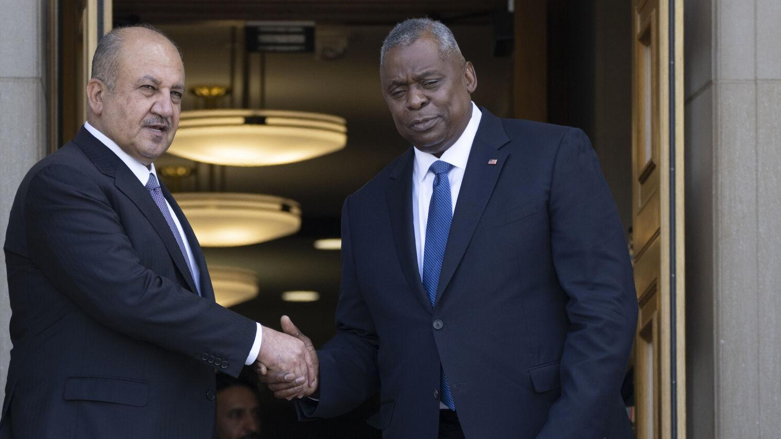Defense Secretary Affirms U.S. Support for Iraq in First Day of Strategic Dialogue
Austin praised "the tremendous progress made by the Iraqi Security Forces in the campaign to achieve the enduring defeat of ISIS and underscored his view that the terrorist group remains a threat.”

WASHINGTON DC, United States (Kurdistan 24) – Iraqi Defense Minister Thabet al-Abbasi led a delegation to Washington, where he met with the U.S. Defense Secretary Lloyd Austin, as they commenced the inaugural session of the U.S.-Iraq Joint Security Cooperation Dialogue (JSCD.)
Today I welcomed Iraqi Defense Minister Thabet al-Abbasi & leaders from @modmiliq & @iraqicts to the Pentagon at the inaugural US-Iraq Joint Security Cooperation Dialogue. We discussed the future of our security partnership & reaffirmed our commitment to the enduring defeat of… pic.twitter.com/uqHceDuYQI
— Secretary of Defense Lloyd J. Austin III (@SecDef) August 8, 2023
The session, which began on Monday, continues for a second day on Tuesday.
The JSCD is a new element in the discussions known as the U.S.-Iraq Strategic Dialogue. That diplomacy was initiated in April 2020, under Secretary of State, Mike Pompeo.
Read More: U.S. Announces Strategic Dialogue with Iraq
The Strategic Dialogue, in turn, builds on the Strategic Framework Agreement, which was concluded between the U.S. and Iraq in 2008, as the George W. Bush administration, under which the second Iraq war was launched, was drawing to an end.
That agreement laid out the basic principles for a “long-term relationship of friendship and cooperation,” between Washington and Baghdad, and that long-term relationship is what the Biden administration is now revisiting and updating.
Indeed, the 2008 Strategic Framework Agreement had languished under Bush’s successor, Barack Obama. As a senator, Obama had opposed the 2003 war that ousted Saddam Hussein, and as president, he sought to minimize Washington’s engagement with Iraq, withdrawing U.S. troops in 2011, before he was obliged to return them three years later to confront a resurgent terrorist threat.
Thus, it fell to the Trump administration to revitalize Washington’s ties with Baghdad, and the Biden administration has continued that policy.
ISIS “Remains a Threat”
In his meeting with Abbasi, “Austin reaffirmed the U.S.-Iraq strategic partnership and underscored [the] U.S. commitment to a secure, stable, and sovereign Iraq,” the Pentagon read-out of their discussion stated.
Austin “praised the tremendous progress made by the Iraqi Security Forces in the campaign to achieve the enduring defeat of ISIS and underscored his view that the terrorist group remains a threat.”
Austin also “expressed his appreciation for Iraq’s commitment to reducing the number of detained ISIS fighters and displaced persons in northeast Syria, and encouraged the Iraqi delegation to continue repatriating, reintegrating, and, where appropriate, prosecuting Iraqi nationals residing in northeast Syria.”
Indeed, the largest number of ISIS prisoners held in northeast Syria are Iraqi. They are detained there by America’s local partner in the fight against ISIS, the Syrian Democratic Forces (SDF.)
Broadening Ties Between the U.S. and Iraq
Reporting on the first day of the JCSD, the Voice of America (VOA) explained that the talks aimed to broaden the scope of the U.S.-Iraq relationship.
The discussions sought to define and implement the “critical steps to expand” that partnership “from one focused almost entirely on countering [ISIS] to one some government officials describe as a 360-degree whole of government alliance,” the VOA reported.
“We recognize … our military mission will change as your forces build up their capabilities,” Austin told Abbasi, describing their discussions as part of the “next step in our strategic defense partnership,” the VOA said.
Abbasi responded that while it was important to “maintain the victories” that have already been achieved, it is “most important now to enhance relationships and the cooperation between us and the United States moving forward.”
“We are very encouraged,” the VOA reported Abbasi as saying, and “we are not going to leave Washington without success.”